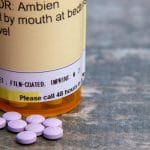Zolpidem tartrate (brand name Ambien) is a sedative-hypnotic drug used as a sleep medication for those suffering from various sleep disorders. Ambien is considered a non-benzodiazepine due to the misconception that Ambien is a benzodiazepine.
This misconception is due, in part, to the fact that an Ambien high is similar to a benzodiazepine high. A person taking Ambien may experience a high, which causes them to have feelings of euphoria, sedation, and drowsiness.
How Ambien High Works
According to the United States Drug Enforcement Administration (DEA), the prescription drug Ambien is a Schedule IV controlled substance which means it can be habit-forming.
Benzodiazepines belong to this same drug schedule as well.
The effects of Ambien may be desired due to the euphoric feelings one experiences.
Ambien is a central nervous system (CNS) depressant which works by enhancing the effects of the neurotransmitter gamma-aminobutyric acid (GABA). This slows brain activity and increases drowsiness and sedation.
Side Effects Of Ambien Use
Ambien use may cause one to experience a number of side effects ranging in severity.
Short-Term Side Effects
In addition to sedative effects caused by the drug, other short-term side effects of Ambien may include:
- drowsiness
- sleepwalking
- sleep-driving
- headache
- sedative effects
- lightheadedness
- memory problems
According to the United States Food and Drug Administration (FDA), sleepwalking and sleep-driving can cause a number of life-threatening health concerns. Accidental falls, drownings, or motor vehicle crashes may take place.
Some who take Ambien can perform these activities, as well as eating or having sex, but may not remember doing so the next day. Memory problems may persist for those who use Ambien long-term.
Long-Term Side Effects
Some of the long-term side effects of Ambien may include:
- physical dependence
- memory loss
- hallucinations
- itching
- shortness of breath
- blurred vision
- withdrawal symptoms
Ambien Withdrawal Symptoms
If Ambien is abruptly stopped, serious withdrawal symptoms may take place and cause a person to experience:
- cravings for the drug
- fatigue
- nausea
- panic attacks
- nervousness
- muscle cramps
- insomnia
- dysphoria
- sweating
- convulsions
- tremors
Dangers Of Ambien Abuse
Taking Ambien in higher doses than prescribed or abusing the drug in any way is just one of the many dangers of taking this drug.
An Ambien high may be exacerbated when a person participates in snorting the drug. Ambien may be crushed into a powder and snorted. A person may participate in this form of drug abuse if they are seeking to hallucinate or experience a more intense high.
Snorting Ambien can lead to serious damage to the nasal cavity. A person may experience bacterial infections, nosebleeds, or a persistent runny nose.
Effects Of Polydrug Abuse
The following should not be combined with Ambien, as serious drug interactions can occur:
- benzodiazepines such as alprazolam (Xanax)
- other sleeping pills such as eszopiclone (Lunesta)
- opioids (prescription or illicit)
- alcohol
- barbiturates
- certain antidepressants
- certain supplements or vitamins
Due to the side effects of Ambien, any medication which mimics the effects of sleep aids such as drowsiness or sleepiness can lead to serious breathing problems. This is why benzodiazepines and other CNS depressants are to be avoided while taking Ambien.
Ambien Overdose
Those who take high doses of this medication or participate in other forms of drug abuse while taking Ambien may increase their risk of overdose.
This can lead to an emergency room visit and, according to the Substance Abuse and Mental Health Services Administration (SAMHSA), emergency department visits increased by almost 220 percent from 2005 to 2010 due to adverse effects of Ambien.
Symptoms of an Ambien overdose, according to the FDA, can include:
- respiratory depression
- fluctuations in heart rate
- loss of consciousness
- severe drowsiness
- seizures
Ambien Addiction Treatment
If you or a loved one are searching for addiction treatment options, Ambien rehab programs may include a combination of medical detox, behavioral therapy, and peer support groups.
To learn about our outpatient treatment options, please contact Northeast Addictions Treatment Center to speak to a healthcare professional today.
Sources
Written by
Northeast Addition Editorial Team
©2024 Northeast Addition Center | All Rights Reserved
This page does not provide medical advice.




